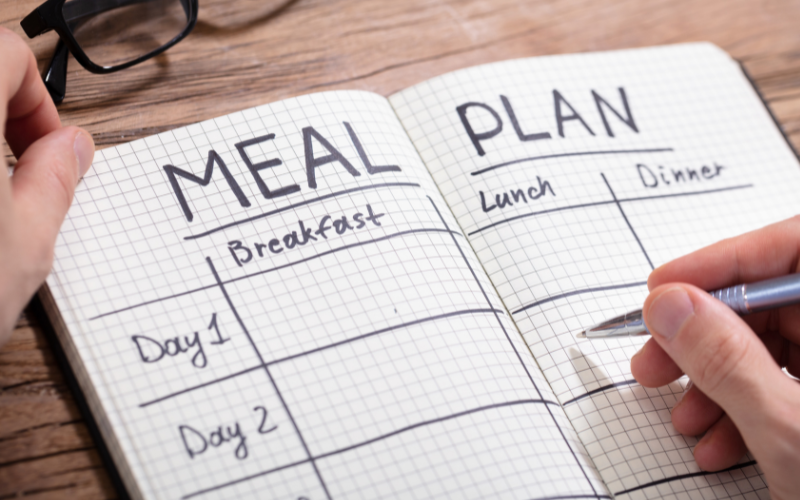Overeating is a common problem that many people face, and it can lead to weight gain and various health problems. However, by adopting simple changes in your eating habits and lifestyle, you can overcome overeating and regain control of your eating habits. This article provides 13 tips that can help you reduce overeating and maintain a healthy weight.
1. Eliminate Distractions During Mealtimes
Distracted eating is a major contributor to overeating. When you eat in front of a computer or television, you tend to eat more without even realizing it. Reviews found that being distracted during a meal leads to an increase in calorie consumption and food intake later in the day. To prevent overeating, it is essential to eliminate distractions during mealtimes. Turn off your phone, computer, or television, and focus on your meal.

2. Identify Your Trigger Foods
Pinpointing your trigger foods is a critical step in reducing overeating. Avoiding these trigger foods can help you control your eating habits. If you find that a particular food triggers overeating, it is best to keep it out of your home or far out of sight. Prepare healthy snacks, such as sliced apples with peanut butter, hummus, and vegetables, or homemade trail mix, to encourage better food choices.

3. Avoid Eating from Containers
Eating from containers, such as a bag of chips or a carton of ice cream, can lead to consuming more food than the recommended serving size. Instead, portion out a single serving size on a plate or in a bowl to help control your calorie intake. Use measuring tools to train your eye on what a normal portion should look like for different types of foods.
4. Reduce Stress = Reduce Overeating
Stress is a major contributor to overeating. Chronic stress increases cortisol levels, a hormone that increases appetite. To reduce overeating, it is important to find ways to reduce stress in your daily life. Consider listening to music, gardening, exercising, practicing yoga, meditation, or breathing techniques to reduce stress levels.
5. Eat Fiber-Rich Foods
Eating foods that are rich in fiber, such as beans, vegetables, oats, and fruit, can help you feel satisfied for longer and reduce the urge to overeat. For example, one study found that people who ate fiber-rich oatmeal for breakfast felt fuller and ate less at lunch than those who consumed cornflakes for breakfast. Snacking on nuts, adding beans to your salad, and eating vegetables at every meal can help reduce food intake.

6. Eat Regular Meals
Skipping meals in an attempt to lose weight can lead to overeating later in the day. Eating more frequently throughout the day can decrease hunger and overall food intake . Eating a balanced lunch can help reduce the chances of overeating later in the day . Instead of skipping meals, focus on eating balanced meals made with whole foods to keep your body satisfied.
7. Keep a Food App
Keeping track of what you eat in a food diary or mobile app can help reduce overeating. Many studies have shown that using self-monitoring techniques like keeping a food diary can aid weight loss. A food journal can also help identify situations and emotional triggers that contribute to overeating, as well as foods that are likely to provoke binge eating.

8. Dine with Like-Minded Friends
Dining with like-minded friends can have a positive impact on your food choices and help reduce overeating. Surrounding yourself with individuals who have similar goals and values can help you make healthier food choices and maintain healthy eating habits.
Here are some tips for dining with like-minded friends:
- Dine with supportive individuals: Surround yourself with friends who are supportive of your healthy eating habits and who encourage you to make healthy choices.
- Plan meals together: Plan meals with your friends, such as potluck dinners or cooking classes, to share healthy and delicious food.
- Choose healthy restaurants: Choose restaurants that offer healthy options, such as salad bars or vegetarian-friendly options.
- Avoid high-calorie restaurants: Avoid dining at restaurants that specialize in high-calorie, unhealthy foods, such as fast food chains or all-you-can-eat buffets.
- Encourage healthy eating habits: Encourage your friends to make healthy food choices and to try new healthy foods and recipes.
By dining with like-minded friends, you can create a supportive community that encourages healthy eating habits and helps reduce overeating. This can also be a fun and enjoyable way to explore new foods and cooking techniques, and can help you reach your goals for a healthier lifestyle.

9. Reduce Overeating by Practising Mindful
Eating Mindful eating involves paying attention to your food and eating habits, without distractions. It can help you become more aware of your eating habits and reduce overeating. Take time to savor your food, chew slowly, and enjoy the taste and texture of your meal.
10. Get Enough Sleep
Lack of sleep can lead to overeating and weight gain. Getting enough sleep can help regulate your hunger hormones, reduce stress, and improve your overall health. Aim for 7-9 hours of quality sleep each night.
11. Avoid Skipping Meals
Skipping meals can lead to overeating later in the day. Eating regular, balanced meals can help keep your body satisfied and prevent overeating.
Here are some tips for avoiding skipping meals:
- Avoid skipping breakfast: Eating a healthy breakfast can help jumpstart your metabolism and prevent overeating later in the day.
- Don’t wait until you’re starving: Don’t wait until you’re starving to eat, as this can lead to overeating and making unhealthy food choices.
- Listen to your body: Pay attention to your body’s hunger cues and eat when you’re hungry, rather than skipping meals or waiting too long to eat.

12. Plan Your Meals
Planning your meals in advance can help reduce overeating and promote healthier eating habits. By planning your meals, you can ensure that you have healthy and nutritious options available, and reduce the risk of reaching for unhealthy snacks or junk food.
Here are some tips for planning your meals:
- Make a grocery list: Plan your meals for the week and make a grocery list of the ingredients you’ll need.
- Prepare meals in advance: Cook and prepare meals in advance, such as on weekends, so you have healthy options available during the week.
- Pack healthy snacks: Pack healthy snacks, such as fruits and vegetables, to have on hand when you’re on the go.
- Use meal planning apps: Use meal planning apps or websites to help you plan your meals and track your food intake.
- Cook at home: Cook meals at home, using fresh ingredients, to have more control over the ingredients and portion sizes in your meals.
- Plan for variety: Plan for variety in your meals by including different types of foods, such as fruits, vegetables, whole grains, and lean proteins.

13. Don’t Ban All Your Favorite Foods
Restrictive eating patterns that eliminate your favorite foods can lead to overeating and binge eating. Instead, focus on eating whole, unprocessed foods most of the time, and allow yourself an occasional treat. If you have a food addiction, you may need to abstain from trigger foods permanently.
Let’s recap
By following these tips, you can develop a healthier relationship with food, improve your overall health and well-being, and feel confident and proud of your progress. You deserve to feel good about yourself and your eating habits, and with a little effort, you can achieve just that.
So take the first step today, and embrace a healthier, happier future!




